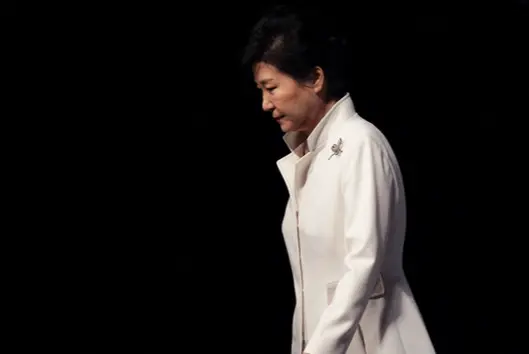By APD writer Du Baiyu
Park Geun-hye, elected in 2012 as South Korea’s first female president, was accused, in October, of abusing power in an influence-peddling scandal centered on her confidante, Choi Soon-sil, who held no political office, but had religious and family connections distrusted by the public.
The country’s 300-seat unicameral parliament last Friday voted 234 to 56 for the impeachment of President Park, in the second attempt in the country's history to oust an incumbent president.
The constitutional court is now under strong public opinion and widely advised to fasten its review process on the impeachment to help put the country back on a normal track.
South Koreans, who once believed that Park that doesn't have family and estranged from her siblings would purely dedicate herself to Korea’s future, were very disappointed and felt betrayed after the scandal. Her approval ratings have plummeted to 4%, the worst ever in the country’s presidential history.
“The affair raises the question of whether she was ever making her own decisions or even capable of doing so,” said Charles Morrison, president of the East-West Center, a think tank in Honolulu.
When Park announced her candidacy for president back in 2012, South Koreans were sympathetic towards her pathetic destiny. During her campaign, Park, who has never married, said the absence of family life meant that she would be able to devote every waking moment to serve the country.
Park came to power, promising better ties with Democratic People’s Republic of Korea and country’s booming economy. Four years later, she has failed to fulfill either policy commitment.
Choi had access to confidential documents and information for the president and faces embezzlement charges, while Park has repeatedly denied to admit of seeking any personal gain. Park’s lawyer has denounced as groundless prosecutors’ allegations that she was “collusively involved”. A recently-appointed independent counsel is widely expected to investigate into bribery charges involving Choi and chiefs of large business conglomerates.
“Can you hear the roar of the people in front of the national assembly?” Kim Kwan-young, an opposition lawmaker, said before the impeachment vote held last Friday.
“Our great people have already opened the way. Let’s make it so we can stand honorably in front of history and our descendants, " he said.
After the vote, the people outside cheered and held up signs saying “Victory for the people” and “New Republic of Korea”. “Choi-gate” aside, Park has faced intense criticism over her handling of the April 2014 Sewol ferry tragedy, in which more than 300 schoolchildren and teachers died. Park was absent for seven hours on the day of the disaster, sparking a flurry of media speculation over her whereabouts.
Until now, massive anti-Park street candlelight protests have been peacefully demonstrated in seven consecutive weekends, claiming that Park should be deprived of the right to receive a state pension after departure via impeachment. Citizens said they have offered a grace period of up to six weeks. Now there is no “voluntary resignation” or “honorary exit” for her.
Park, who once maintained a nice balance in foreign policy, has kept committing serious mistakes last year. Her once cautious and appropriate manner suddenly disappeared, which could hardly be explained until the influence-peddling scandal was blown up. More investigations are needed to clarify how deep Choi had involved in national security issues.
The decision of South Korea and the US in July on deploying the Terminal High Altitude Area Defense (THAAD) system in her country has also resulted in public fury over Park’s administration at home, and it has been firmly opposed to by China and Russia.
The Blue House, claiming the system would protect the county from its northern neighbor’s attack, was repeatedly advised to be cool-headed and to think over what the deployment could actually bring to the country's security. By deploying the THAAD system in South Korea,
Washington not only ties Seoul onto its chariot, but also casts a shadow of a new Cold War over Northeast Asia, to the detriment of regional peace and stability.
For South Korea, the misjudge is largely seen as a serious damage to its political mutual trust with its neighbors and an invitation for economic punishments which Seoul cannot afford. The facts of the behind-the scenes motives should be find out, and any excuse for the deployment would be unjustified.
Park’s nearsighted and hotheaded decision would do no good but break the strategic balance in the Northeast Asia, and in return become a stumbling block for the settlement of the Korean Peninsula nuclear issue.
The impeachment marks a stunning downfall for Park, who was once known as the “queen of elections” now faces her Waterloo, with final destiny remaining unclear.
(APD)
 简体中文
简体中文

